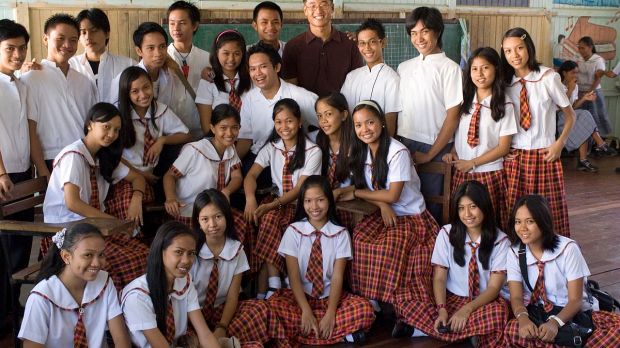Last January, I asked my students to fill in this sentence, “I believe in ____.”
I teach at a Jesuit university in the Philippines that has produced presidents, heroes, priests and some of our country’s best professionals. So, when I asked them to fill in the blank, it wasn’t to break the ice. I wanted a peek into my country’s religious future.
Despite the Philippines being 80% Catholic, only two of my 63 students filled in the blank with “God.” No one mentioned Jesus. Most answers were existential abstractions like “freedom,” “hard-work” and “positivity.” I wasn’t too surprised.
This exercise reminded me that despite our label, Catholicism among Filipinos is little understood. Because if it were better understood, I don’t think they’d be satisfied with believing in mere concepts. Of course, “change” and “choice” are powerful words. “Positivity” and “goodness,” magnetic. Still, these are faceless ideals.
Their answers revealed that even with a decade of Catholic education, few really know the potent secret of their inherited creed. Most can’t see that Catholicism is about all these powerful ideas, but also much more because the Catholic God has a face and a name. The Catholic God continues to call, speak, and thirst for human connection.
From my own upbringing in Manila’s Catholic school system and conversations with other religious educators, I notice three causes behind this sad trend.
1. Religious education places too much emphasis on Church law, doctrine, and highbrow theology. Teachers are too focused on what the Church teaches about this or that moral issue, or the intricacies of a particular exegete’s scriptural interpretation. They measure students’ knowledge according to how well they memorize dogmas and exegetical theories. Many prohibit their pupils from questioning what is taught in class, so only a few arrive at an owned understanding of Christianity’s core beliefs.
2. Teachers hardly mention the Incarnation, and how this life-changing mystery remains with us today. In my 13 years of catholic school, only two of 10 teachers exposed me to the deep connection with Jesus that happens at Mass and Eucharistic adoration. It’s possible to discover this gem outside of school, but most students don’t have the opportunity. Also, I find it a disservice to require 10-12 years of compulsory religious education, without ever exposing students to the Church’s source and summit of faith.
3. Too little is said about how Christ’s mercy leads to virtue. If mercy is talked about at all, it sounds more like letting sinners off the hook, instead of a redemptive and sanctifying power. For this reason, it is seen as a nice benefit, rather than a force that fuels and pushes believers to live virtue. One consequence of this superficial view is that even with our Catholic majority, our government is one of the most corrupt in the world.
These bad habits show that we’re doing a better job hiding, rather than sharing what makes Catholicism worth keeping. We emphasize rules instead of redemptive encounter. We convince students that Catholicism equals hard-to-remember intellectual words, and not a sacred, life-changing relationship. So they leave our classrooms with the misperception that Catholicism is more dead letter than alive and enriching.
If we continue on this path, they will likely discard Catholicism, because what’s worth keeping in an insipid set of rules, abstractions, and interpretations? Why believe in a complicated web of laws, when minimalistic slogans are easier to remember and live by? Why practice a faith if you don’t realize what it does to make society more just and loving?
To turn this tide, we need to start showing what makes Catholicism worth more than the best of human words: a God who transforms lives by becoming flesh, 2,020-some years ago, and every day since.
I think teachers/ catechists must:
1. Learn to tell the story of the Incarnation in an emotionally engaging way, and encourage students to explain this mystery in their own words.
2. Share stories about real lives changed for the better after encountering and developing a relationship with Jesus. Real stories always help breathe life into concepts and dogma.
3. Encourage young people to seek out meaningful, relational periods of prayer every day, especially at Mass and in Eucharistic adoration.
Hopefully, these habits remind our students that what our faith has to offer is so much more alive than fashionable ideals, because at the heart of it is a God-man who wants to speak to them, touch them, embrace them, and heal them. A God whose deepest longing is to make each of them mirrors of him.

